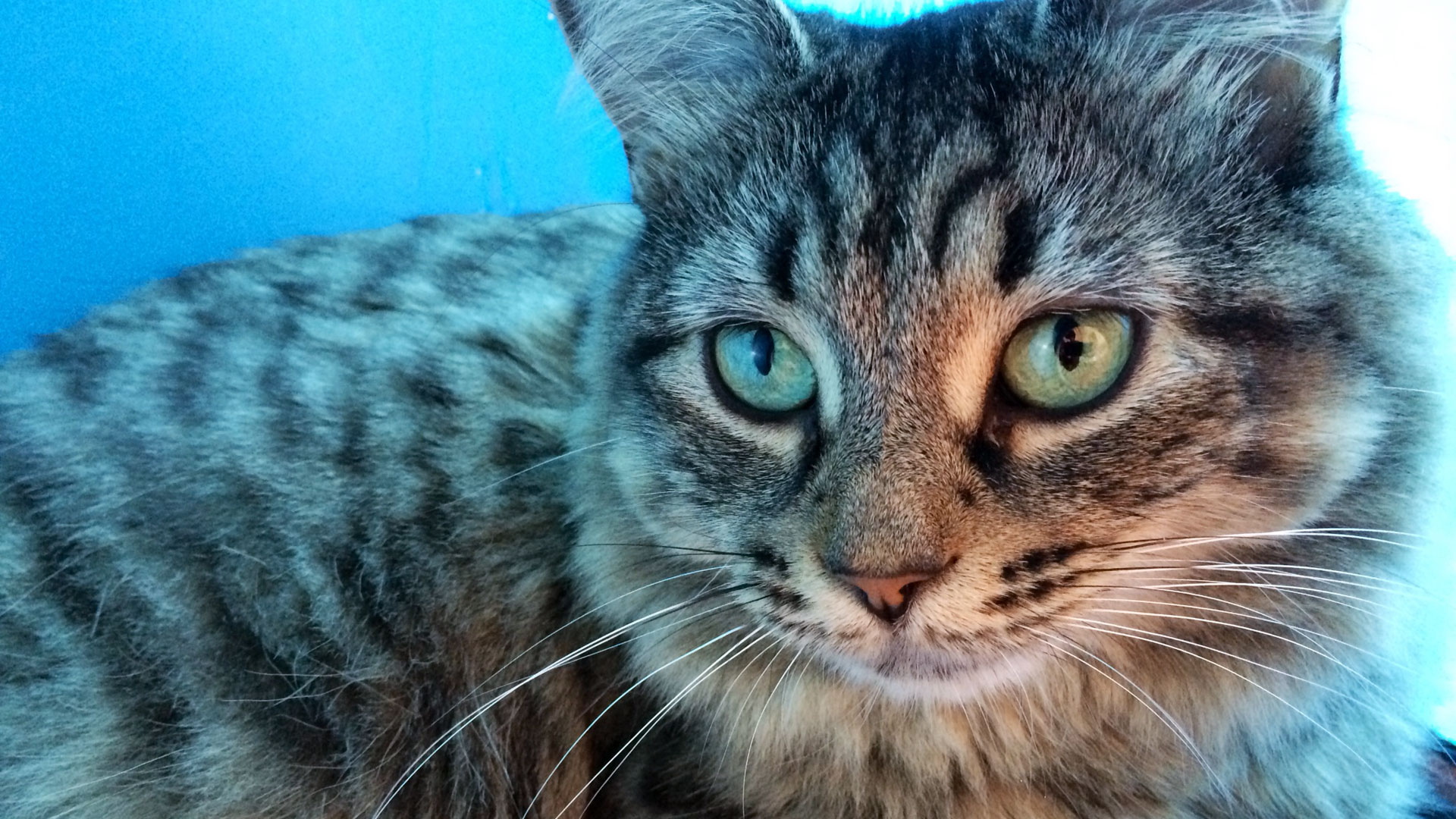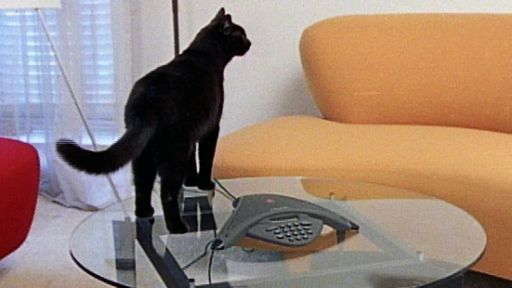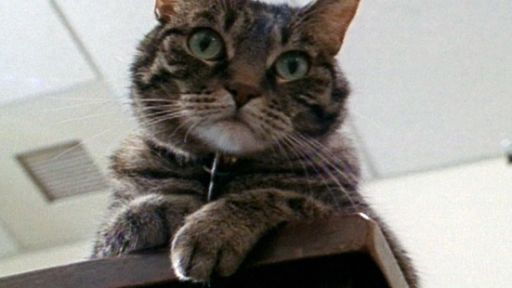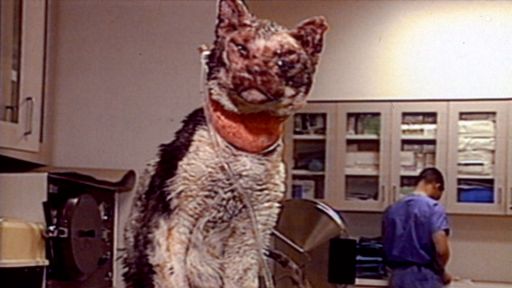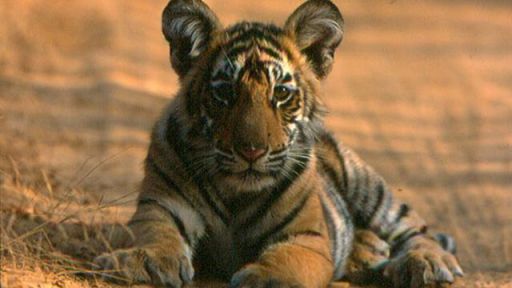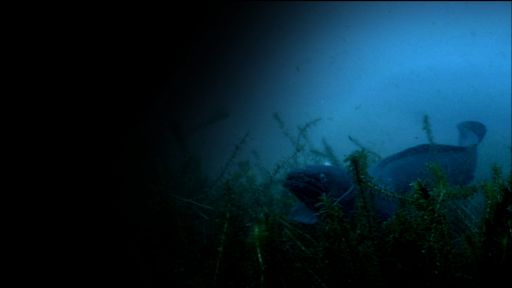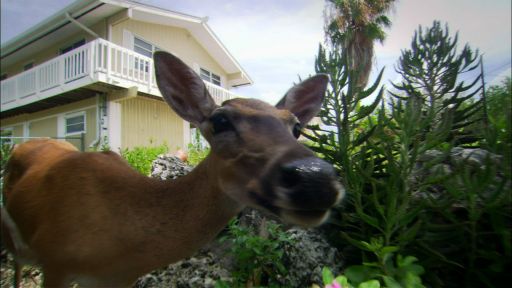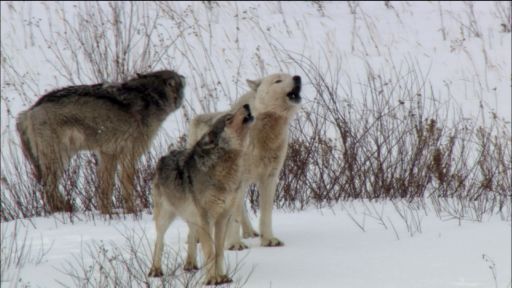TRANSCRIPT
- [Narrator] On the south coast of England in the town of Weymouth lives an extraordinary cat named Reebok.
Reebok is much more than a family friend.
To his owner Sue Coker, he's a hero.
- After I became pregnant it was almost like he knew.
As soon as I sat down he was there, he'd cuddle into me.
It was almost like he could hear the little baby inside.
Incredible and when Bethany was born, he just basically swapped allegiance from me onto Bethany.
- [Narrator] Reebok and Bethany take care of each other.
- He was her little guardian he'd always be there.
At night when she finally went into her own room at 10 weeks he was always outside her door.
- [Stuart] It was uncanny wasn't it?
- It was.
- I've never seen any animal, dog, do anything quite like it.
He was, he was her guardian.
It was as simple as that really.
- [Narrator] It was a peaceful July night when Bethany was just nine months old.
As usual, Sue and her husband Stuart put Bethany to bed and Reebok took up his post.
- [Sue] It was a night like any other night.
She went to bed in her cot, we trundled off to bed quite early, round about 10 o'clock.
- [Narrator] The Cokers fell fast asleep, never dreaming their sleep would be shattered.
Sometime after midnight, they were suddenly awakened.
- [Sue] Reebok came hurtling into the bedroom.
He was patting the bed, crying really agitated sort of like, "Follow me, there's something up."
So we did.
[Bethany cries] - [Narrator] When they got to Bethany's room, she was choking and gasping for breath.
- [Sue] And it was like my God, she was burning up she's in a major temperature.
She's never been a sick baby, so we knew there was something wrong.
- [Narrator] The Cokers called a doctor to the house where he found Bethany with a raging ear infection.
- But the next morning it was like wow, Reebok actually came in and got us.
You know, he was so concerned and I think it sort of dawned on us then that you know, he really saved her life.
- [Stu] I can't really understand why he did it.
I've never believed in a sixth sense or anything like that, but he demonstrated something like that to us.
- [Narrator] What Reebok did that night was beyond just knowing that Bethany's life was in danger.
He also knew he had to get help.
What is the bond he feels for this small child?
Why has he appointed himself her protector?
We have no way to ask him, but in honor of his lifesaving deed, Reebok has been nominated for an Arthur Award, granted to pets for valiant behavior.
But Reebok's devotion shouldn't come as such a surprise.
It's just one of the extraordinary ways that our cats can transform our lives.
[upbeat music] - [Narrator] This program was made possible by contributions to your PBS station from viewers like you.
Thank you.
- [Narrator] Why is it we find cats so fascinating?
Is it because they are loving and playful?
Or is it their cool independence?
How can one creature be so complicated?
- [Carole] There's no way you can possibly own a cat.
He lives to make himself happy.
He's not going to be controlled.
- [Rex] Dog's love is unconditional.
Cat you have to work for it - [Debbie] Everything is on their terms.
They allow you to like them - They don't require attention all the time.
But when they want attention, they'll let you know it.
- [Sue] I think all cats are individuals you can't actually say, a cat is like this because they're not, they're all different.
- [Narrator] There's no question about it, cats command our attention.
The big cats inspire awe.
They are powerful, elegant, so excitingly dangerous.
Our little cats are just as capable.
It's only their size that gives us the illusion that we're in control.
And the longer we know them, the more interesting they become.
Cats possess powers that defy explanation.
They can find their way to places they've never been before, sense a pending disaster days in advance, and soothe our souls when we need it most.
Cats, complex and contradictory, are now using their powers to become our best friends.
Today in the United States, they outnumber dogs as pets.
Independent, autonomous, cats are the perfect companions for the busy, mobile people we have become.
While we keep our dog on a leash or in a fenced yard, we think nothing of letting our cat wander where she will.
And once outside and on her own, a cat becomes the creature she is designed to be.
Her senses sharpen.
The familiar back yard is now the jungle.
And in our gentle little housecat we see the eyes of the tiger, the heart of the lion.
Hunting runs in her blood.
It makes no difference how well we feed her.
Every little cat still heeds the call of her ancestors.
Maybe it's their closeness to the wild that attracts us to cats.
But what do such competent, self-reliant creatures see in us?
It's an old story, and of course, it's about food.
Food means life to every animal.
And as humans started to grow their own supply, they also began to store the harvest.
Mice and other rodents soon moved in and multiplied.
Small wildcats from Africa to Asia quickly learned; where there were people and their crops, there would be good hunting.
[kittens mew] Kittens, orphaned or abandoned, would surely have been brought home to play and grow up among the human children.
When they were old enough to hunt, they kept mice under control in the territory they knew best, our houses and fields.
And so it is today.
Four thousand years later, the cat has come in from the cold, but hasn't really changed at all.
Still a hunter out on patrol, it can choose between civilization and the wild.
[cars honk] Some cats seem destined to roam, and others travel great distances to return to one special place.
There are hundreds of reports from all over the world of cats and their incredible journeys.
A recent case was a cat from Bath, England named Sooty.
- And finally tonight, we have the story of an incredible journey by a black cat called Sooty.
It took half a year, but somehow she found her way from Bath back to her old home in Swansea, a hundred miles away.
Tim Rogers reports.
- [Tim] Your paws would be sore too if you just walked a hundred miles.
But distance is no barrier for Sooty, the black cat from Swansea.
She spent 6 months trying to find her owner and after an extraordinary journey, she succeeded.
- [Narrator] Sooty belongs to the Rev.
Jennifer Montford Davies and her daughter Claire.
At the time of the story, the family had just moved to Bath, leaving behind the home where Sooty grew up.
- We moved from Swansea to Bath in August 1996 and we had our three cats with us.
We had to leave my son and daughter, Jonathan and Claire behind in Swansea as both were students at the time and in the middle of courses there.
- [Narrator] One Autumn evening, not long after settling into their new home, Sooty went out as she usually did.
But this time, one night turned into the next and Sooty did not return.
With winter approaching, the Davies became concerned.
They searched the neighborhood, to no avail.
- [Jennifer] We looked everywhere, but she never came back.
- [Narrator] Miraculously, six months later with no previous knowledge to guide her, Sooty arrived back in Swansea.
But what was truly remarkable was that she had found Claire at her new apartment, a place she had never been before.
- It was a Monday morning, my brother had just woken me up saying you'll never guess who's in my flat.
And as soon as I opened my brother's door, the cat jumped up and I picked her up.
And she normally used to sit on my shoulder, looking behind my back and she went there and I carried her up to my room and then I went to phone my mum.
She didn't believe a word I was saying!
- [Narrator] But how could Claire be certain that this was her cat?
- [Claire] I know it's my cat because I had this connection between my cat.
She always used to meow for food and we used to meow back at her and we use to have these conversations meowing and everybody just started thinking I was mad, but I was actually talking to my cat.
- [Narrator] There are only two ways Sooty could have made it from Bath to Swansea.
If she went by land, via the city of Gloucester, she would have walked over 135 miles.
Or she could have crossed the fast moving Severn River, on one of two, dangerous bridges, still a trek of 90 miles.
How on earth did she know where she was going?
What kept her on the right track across strange country with so many obstacles?
Psychobiologist David Brown studies a range of unexplained animal behavior and he has a theory.
- The only explanation I can think of that can account for this is from physics where we know that whenever two particles interact, they have a bond that connects them, that's beyond time and space.
This is the only explanation that I can think of that might help to shed some light on this very mysterious phenomenon.
This only occurs between humans and animals that have very, very close bonds.
- I think she was looking for her family.
And her family was Jonathan and Claire, the two children she had grown up with and they had grown up with her.
I think she was looking for her family.
- [Narrator] Only Sooty knows for sure, but she may have returned to Swansea to seek out her former hunting grounds.
Not finding her family there, she set about locating them.
These days, Sooty still visits the neighborhood, but chooses to live outside on her own.
She remains a mystery, an enigma, the quintessential cat.
Besides their ability to navigate, cats have other peculiar powers that we cannot explain.
The relationship between unusual animal behavior and the onset of earthquakes is another mystery that David Brown is investigating.
- [David] We're collecting stories from people who've experienced this and we've got actually quite a few stories, close to a hundred stories now.
We've also been doing telephone surveys in different earthquake prone areas.
- [Narrator] In Los Angeles and the San Francisco Bay area, Brown found that 15% of his respondents noticed their pets acting strangely just prior to an earthquake.
- [David] Pets seem to actually become more agitated, more frightened.
They tend to try to burrow and hide.
They get panicy, they get fearful and hyper sensitive to stimuli.
- [Narrator] Another researcher has discovered that reports of missing pets more than double before the onset earthquakes.
On October 13, 1989, geologist James Berkland published a chilling prediction in a Northern California weekly.
Four days later, the Loma Prieta or "World Series" quake struck the Bay area.
At 7.1 on the Richter Scale, it was the most devastating quake in San Francisco since 1906.
Are cats receiving some signal from the earth itself of imminent disaster?
With what faculty of perception can they tune in to movements in the earth's crust and disturbances in its magnetic fields?
Its still a mystery, but where science fails, the cat succeeds.
[dogs bark] At the Humane Society of Pasadena, California, the dogs who are up for adoption here rely on a cat who has extraordinary powers of perception.
Meet Maggie, the dog testing cat.
Before a dog can be placed in a new home, it must earn Maggie's personal seal of approval.
- What we are going to do is take this dog in here, in this room and Maggie is going to be there, she's going to be on the table.
- [Narrator] Adoption counselor Ute Miketta-Nickel explains that Maggie will test how this dog will react to his new owners' cat and determine if the adoption will be a good match.
- We wanna make sure your pet is safe.
All right.
Maggie has been doing this for years now so she very well knows how to protect herself.
So far she has never been attacked or bitten, so she always has the upper hand, okay?
She knows how to take care of herself, so we don't need to be afraid.
- [Narrator] Maggie excels in evaluating a dog's character.
Almost instantly, she assesses his innate aggression, curiosity, or fear.
[Maggie hisses] Maggie's judgment is swift and sure.
A few lessons in manners are all this one needs.
But no two dogs are the same, as Maggie well knows.
[Maggie yowls] This contestant is only interested in people.
Sensing no challenge, Maggie feigns indifference.
This sweet black lab has just won a future full of cats.
- Well guess what?
You got a home with four little pussycats.
- [Narrator] Maggie's work can spring a dog from its pen and help it to find a home with a new family.
Otherwise the shelter will be its last stop, a sad and sorry end.
[upbeat music] Across L.A. county, a prison has formed a partnership with a local animal shelter.
Here, at the Pitchess Detention Center, men do time for robbery, for probation violations, for possession.
Every morning a truck pulls in from the Castaic Animal Shelter carrying refugees who, like the men inside, could use a second chance.
Debbie Pieropan runs a program that benefits both the animals and the inmates.
The men find that working with animals can lead to real opportunities on the outside.
And these unwanted cats need the care and attention of the men in jail if they are to survive at all.
- Our goal here is not only to educate the inmates but to get these animals cleaned up and hopefully make them more placeable.
Okay, this is Raider, he's a 4 year old kitty he just came into the shelter and is available for adoption.
His people turned him in because they had a baby.
He's a big cat, so support him on his belly.
There you go.
They're really scared, they just got there.
Now because he's really, really nervous, so he's going to lose a ton of hair.
- [Narrator] The animal shelter has seen remarkable results.
Their adoption rate is significantly higher than average at least 50% of these cats will find homes.
- Let me get you a towel.
And what we'll do is cover his face and let him see if he feels like he's hiding he might do better.
- [Narrator] And the inmates are quick to sense just how the animals feel.
- It's okay.
It's all right.
- I'm in for residential burglary.
My sentence is a year.
I've been in for four months already.
- I'm in for burglary.
What do you call it?
Commercial burglary?
You know, got 150 days.
[cat yowls] - [Narrator] There's a lot to learn about cat care, from basic grooming to controlling parasites to simply making a nervous animal more comfortable.
- You don't have any fleas, do you?
That's good.
You're not shedding that much, so you're not stressed out, huh?
I've learned to trim the nails, look for fleas and ticks, clean the ears.
Bathe the animals.
Basically clean them up, so they look good enough for adoption.
- Hold the ear with one finger.
Oh, he's purring.
Like a little motorboat.
Right, hold it just like that.
- It enables us to get a job when we get out.
It's something I would like to do when I get out.
- It's very exciting to come back from the animal shelter and let them know that an animal they have groomed, say last week, has been placed.
- It makes me feel good about myself.
Makes me feel like I'm accomplishing something, I'm helping an animal to possibly get adopted.
- It's okay kitty kitty.
It's okay, I'm just getting fleas.
- The inmates learn that it's okay to be sensitive, to have feelings, to hug something.
They're doing this in front of other inmates and I do know that outside here the other inmates from the other educational areas, they heckle 'em, they call them poodle puffers and they bark at them, but these guys put up with them and they deal with it.
- Put it all over and then we'll rinse him off.
- Here kitty kitty.
- Let's get those underarms.
- Get his belly and his tail.
There are a lot of different impressions we get about inmates.
And working here and working with them and seeing them work with the animals and trying to save these animals.
A lot of them and most of them that come through these doors are not so bad.
And I think that what they give to that animal and in return that animal gives back to them.
[kitten yowls] - He's there and he gives you love.
Maybe you're lonesome and he'll come sit on your lap and he'll give you affection.
And I think that's what brings, you know it's like a relationship between you and your animal - I think with all animals, you get that kind of connection with them after a period of time, after they've been around you and you've been around them.
At some point in time, you get that connection and it's a good feeling.
- They're in the same predicament we're in.
They can't go nowhere.
It's like them being in jail.
So we pretty much feel the same way.
This puts him to ease.
Me brushing and me petting him puts him to ease.
He knows he's going back to a shelter though.
See, me brushing him puts me to ease, cause I know I'm helping him calm down.
[somber music] - [Narrator] The cats offer a shelter of their own from the world these men really live in.
- Once you get back into the jail, you go back to everything in the jail which is all the stress, all the worrying about the family on the outside.
We're here from seven in the morning until two in the afternoon and all it is relaxation.
It's all it is, it's wonderful.
[kitten mews] - [Narrator] On the streets of Van Nuys, California, it's a routine patrol for the LAPD.
But this is homicide, the toughest unit in the force.
These officers have seen the worst there is to see, it just comes with the job.
Detective Steve Fisk has 32 years of service under his belt.
He's a professional at tracking down killers of one kind or another.
- So where's Killer?
- He's under my desk.
- [Carol] Oh yes, she's in one of the desks.
- [Narrator] Killer, of course, is a cat.
A cat not even detectives can find.
- I'm trying to get the cat to come out from under the desk.
- [Narrator] An undercover camera can catch her.
- She sits on desks, meanders through here.
- She makes no bones about jumping on your desk and walking around.
Walk right through the keyboard here sometimes.
- [Narrator] Killer doesn't exactly work homicide.
It's more like she owns the place.
- Go through these, to clean the cat hair off of our legs.
- [Detetive] We all have our cat rollers.
- And if you're wearing dark pants.
- When I first came in to homicide, if I was wearing a skirt or a dress, she'd swat a paw at my leg and I'd wind up ruining a pair of nylons, so we didn't' hit it off very well.
I don't know, maybe it's two females working in the same office.
I don't know.
[cat food clatters] - So where do you think the cat's at?
- She usually hides over there under Roberta's desk.
She's just not gonna do it.
- [Narrator] But in Van Nuys, killers eventually get caught.
- I think it's comforting to have a small animal or an animal around in an environment that's generally hostile.
Homicide obviously is usually a place that dealt with trauma, a lot of human discomfort.
So in my opinion, if you have an animal about, it does give you some relief factor.
I don't think we've named the cat yet officially other than Killer cat.
I think it's a name because it's synonymous with homicide.
Obviously, the cat was not a killer.
- Your cat is always there for you.
You need something to hug, you need something to reach to out and say, "Gee I, you know, I want to feel good!"
Or you just look at you cat and your cat is purring, and the next minute you find that you're breathing easily.
A cat can be such a wonderful high because of a cat's contact.
- [Narrator] Carole Wilbourn has been treating cats for more than 25 years.
Author of four books on cat behavior, she writes a regular column in Cat Fancy Magazine.
But her specialty isn't medicine, it's psychology.
Dr. Wilbourn is a cat therapist.
- I deal with cats' emotional and behavioral problems.
I try to solve them, so their cat becomes a happier cat.
I find this easy to do because I truly like people and my background was human psychology.
So it's very easy for me to be the advocate of the person and the advocate of the person's cat.
- [Narrator] Wilbourn may be one of the only doctors in New York to make housecalls.
But to treat her patients, she needs to know exactly where they live and how they relate to their owner.
The relationship between a cat and it's person is the key to happiness.
Today, she's seeing Elsie Maio and her two cats Raphaelo and Lippy.
Used to country living, the cats are having trouble adjusting to life in the city.
They're destroying the furniture, shredding toilet paper, and are constantly fighting.
Even so, Elsie feels it's important to have them at work.
- What I love about having them in the office, is that I'm trying to create a culture that is not cold and corporate.
And the cats help to remind us of those other parts of ourselves, our creativity, our humanity, our emotional selves.
And they add marvelous comic relief.
- Hi Els, where are the guys?
There's Rafaello.
- I actually didn't get it at first about cat therapy, but I was desperate.
I was first given Rafaello as a gift and decided that I really didn't want a litter box in my life, so I decided to train him to use the toilet.
And Carol, very professionally said, "Well, you know, I can't promise that that will work.
Some cats will and some cats won't."
So from the very beginning, I trusted her because she didn't promise the earth, moon and the stars.
And in fact, Rafaello trained me that he was not going to use what I wanted him to use.
In fact he used the litter box.
- You can't control a cat.
No way can you control a cat.
Unlike a dog.
See it's important for a dog to please his master.
A cat please himself first.
I think they don't have enough recreation here.
And I think we have to give them something so that they'll be challenged.
Just as someone would in their home.
They need to have some kind of equipment that they're going to enjoy other than your office equipment.
I think you need a good scratching post.
I think that would help a lot.
- Carol always has a prescription for me that is elegantly simple and works.
And she helps me understand what my cat is trying to communicate to me through this behavior, so that it's not a matter of them being bad or wrong or difficult.
It's a matter of them trying to communicate and she helps me understand what they're trying to say.
- See?
Cause he wants to be here too.
I find that in order to help the cat, I have to get to the cat's person.
And if I don't have a meeting of the mind with the cat's person, there's no way that this deviant behavior is going to stop.
Because Rafaello is the role model.
It just feels so good if I know that not only I can make the cat happy, I'm going to make the person's going to be happy, because the cat's gonna take care of the person.
- [Narrator] There are people for whom cats are more than pampered pets, more than close companions.
For people on the cat show circuit, cats are their lives.
They have a fascination for anything feline.
Too much is not enough.
There's no need to name names, these people know who they are.
They even admit, of their own free will, that cats have become an obsession.
- I bought a pet cat, and I went to the show and the kitten won a couple of ribbons and I was hooked.
- I love cats.
And I came to a cat show, I couldn't believe all the types of kitties.
And I took a year to decide on a breed and I thought I might want to come out one day, play around.
Little did I know it would take over my life.
- [Narrator] There are some 37 breeds recognized by the Cat Fanciers' Association.
A kind of cat for every kind of person.
- [Monique] This is Tuvak.
He's a four month, long haired Abyssinian - This is an ocicat.
It's a hybrid cat meaning it's a man made cat.
There's no wild blood, it just looks like a wild cat.
It's part Abyssinian, part Siamese and part American short hair.
- [Owner] The color and pattern is known as a silver tabby.
- This is a Cornish Rex.
Very active, very affectionate, as you can see.
- His name's JayLu and right now he's number one in the nation.
He's got the most points of all the cats being shown right now.
- [Narrator] The competition is intense.
The judges are looking for absolute perfection.
- It's like watching one of your kids perform and do really well, and we're all proud.
All I do is groom him.
He does the rest.
- [Narrator] Champion or not, every cat here knows it is deeply loved.
And what could be more perfect than that?
For some people, the ultimate cats are the big cats.
And there is one woman who has taken her love for them to the ultimate extreme.
She established a big cat sanctuary called Shambala.
Her name is Tippi Hedren.
In the 1970's, she produced and starred in a film featuring several big cats.
When filming was finished, the cats had no where to go.
So Tippi decided to take care of them.
- [Tippi] It really just changed all of our lives.
Because in doing so, we we were getting to know the lions, the tigers and the leopards on a one to one basis which was absolutely fascinating.
- [Narrator] Best known for her starring role in Hitchcock's classic, "The Birds," Tippi has devoted much of her life to conservation and animal welfare.
Shambala's 80 acres are home to more than 60 big cats, all castaways in need of a safe haven.
Lions, tigers, leopards, and their kin sometimes turn up where they don't belong.
The lucky ones come here to Tippi's.
Xhosa was recently living with a dentist in Cincinnati who thought a lioness would make a good pet.
He was badly mistaken.
Confined in a small cage, Xhosa was covered with sores from rubbing against the bars.
One year later, her sores have healed, and Xhosa is living among her own kind.
No matter what you do, a lion will never be a house cat.
Tippi develops friendships with them slowly and carefully.
- The relationship I have with the big cats is of course different because they are so powerful.
Oh, there you go.
We have to know what the body postures mean, what the vocal sounds mean of these animals in order to stay safe with them.
And in order to have a relationship with a big cat, you have to be with that animal every day.
And so they really get to think of you as a real friend.
If you just come around every now and then, that doesn't mean anything to them.
There's a real loyalty and a real bond.
- [Narrator] The lions sometimes act like overgrown kittens.
While we often notice big cat behavior in our own little pet, there's a glimmer of the house cat in the king of beasts.
- I don't think that domesticated cats are really domesticated.
I think they are wild.
I think we have very little control of what a cat does, or what he's feeling or thinking.
Or whatever like you do a dog.
I think there's very little of that.
We just said goodbye to the tiger.
Typical cat!
- [Narrator] Shambaia offers a happy ending to many unwanted exotic cats.
And a special opportunity to the public as well.
If you've ever wanted to get to know one of these great cats, here is your chance.
Under Shambala's adopt a cat program, you can choose to sponsor a mountain lion or snow leopard of your very own.
There are special days when only sponsors are allowed into the preserve and they feed their own cats personally.
This gives the cat a chance to get to know them.
And food for any wild animal is the beginning of friendship.
- Well, this is Pepper and he's 20 years old.
And uh, he's a good kitty.
He just livens up every time he sees me, or every time he sees the cooler.
He sees the food and he just goes nuts.
- Hey you!
A lot of you parents know about Subira, but for those of you who are new, this is of course an African Cheetah who is one of the most endangered animals on the planet.
Subira, while she was in the womb, the umbilical cord was wrapped around her right hind leg and it couldn't' receive any circulation, it atrophied and had to be removed, so she doesn't know what it's like to have four legs.
She lived there for a year.
They like to have all their cheetah together, but as you know, instinctual dictates to fight.
That this animal would be taken out by her same kind because if you're not perfect in the wild, you don't get to live.
There's a very, very special bond that occurs with cats and humans, I think.
And it's always a great honor.
They somehow give you the impression that it's a great honor when they come and sit next to you.
The bond is so strong, that even after they've gone to their Shambala in the heavens, they still come back to me, I still talk to them.
Because I've had so many strong relationships with these animals that they're very, very special to me.
- [Narrator] After a lifetime in the loving company of their animals, people can suddenly find themselves alone.
No longer able to care for themselves, they have to give up the pets that have meant so much to them.
Here at the Loretto Heights Nursing Home in Oswego, New York, there's a program to bring animals back into people's lives.
The patter of furry little feet makes the place feel less institutional.
And project coordinator, Kym Crapser, feels that animals are good for the soul.
- I think just knowing there's a pet here like they had at home is something that is wonderful.
- You see cats, you see the birds, it makes it more like a home.
They are part of the world, they are part of the environment and they are what makes the environment complete.
- [Narrator] The first cat came to Loretto Heights in the springtime.
His affectionate nature made the experiment a success and paved the way for others.
There's Pumpkin, a little calico female who greets the staff every morning when they come in.
Smokey is a full time resident, too, and she's always able to sense when someone needs a friend.
- [Resident] You're awful fussy aren't cha?
- [Kym] This project gives the residents a chance to care for something rather than just be cared for.
It gives them the feeling of being needed.
They're not as lonely with the animals around, they don't feel like they're being stuck here to live out the rest of their lives.
They actually feel like there's something here worth living for now.
- I get a kick out them.
- [Kym] When the cats first came in here, there was a little bit of; is it going to be more work?
How will they fit in with the residents?
What about the residents that aren't going to like them?
- Well I really don't approve myself.
And I like cats, I've always had cats, but I don't like strange cats.
You can trip over them and all.
- We're trying to make this home, but it's a lot to get adjusted to.
But once they do, they're doing wonderful.
- [Narrator] The cats take an interest in everything.
The nursing home is now their territory and they patrol it with an air of ownership.
In no time at all, their quiet presence proves irresistible.
- They're affectionate, they seem to like you, so then you like them so it's a vicious circle.
- The love they show is phenomenal, just phenomenal.
Especially when there's a resident who is very ill on the floor.
- [Narrator] That's when Smokey does something truly extraordinary - There were three or four residents on second floor where Smokey lives that were on their way of passing from this world and she went in there they tried to take her out and she came back in so they decided to let her stay and she stayed until that person passed.
- You can always find Smokey in that room.
Always.
Sometimes before we even know that the resident is about to pass, the cat is there and it signifies to us that something in that room is going on.
It's extremely interesting, it's just unbelievable, actually.
- [Sharon] They're intuitive, they know when they're needed and they just stay there.
- [Lisa] Mr. Leavens, next door, he is bedfast so he enjoys that company of a cat.
And Smokey spends all day in there every day there almost.
- [Kym] I really feel that we can not tell what people can hear and not hear when they're dying.
This is just something that is priceless for them to be able to have an animal laying by them.
[somber music] - [Narrator] Cats are extraordinary creatures in every way.
Finely tuned to things we can barely sense at all, they live life with a self-contained wisdom.
They can be aloof and independent, but their affections run surprisingly deep.
And when a cat feels love, it can also act with amazing courage.
In the East New York section of Brooklyn, David Giannelli has been a firefighter for more than 20 years.
He has a certain instinct for helping animals in trouble.
- They call me the animal man cause I usually help stray animals and feed stray animals and anything I can do for them, I do.
I've always had animals as I was growing up, dogs, cats, birds and I got to understand how animals feel and what their expressions are and try to learn how to read them.
And I've taken that through my life you know, up until this point.
[fire crackles] - [Narrator] It was just before dawn on a cold night in March of 1996.
Giannelli and his crew responded to a four alarm fire in an abandoned auto shop.
The blaze was raging by the time they arrived, but above the sirens, the wind, and the roar of the flames, Giannelli heard tiny high pitched cries.
- One of the other firemen that was standing next to me said to me, "Dave, you hear that?"
And I said, "Yes, I do.
Where's it coming from?"
The noise that we were hearing was noises of cats crying.
As men were pouring water on the outside the building, I had asked the lieutenant can I find out where the noises are comin' from, the cat cries and he said, "Sure."
So I looked through the smoke and there I seen three kittens huddled together, crying, shivering, you name it.
They were afraid.
You know, they were hurting.
And they were only oh, I don't know, couple inches long at that point, maybe a couple weeks old.
- [Narrator] Giannelli then found two more kittens, making five in all, that had somehow been rescued.
Then he began a careful search for the mother.
- I found her huddled up in a ball in pain up against a vacant building.
This cat was in real bad shape.
You know, her whole face, her paws, her underbelly and everything was burnt severely.
It was really horrible to see.
You know, because I mean, to see an animal in pain like that, I just knew that I had to do something for it.
- [Narrator] Giannelli called the North Shore Animal League where he had brought abandoned animals in the past.
Marge Stein took the call.
- The voice was the same and he said to me, "Marge, this time it's a cat and it's a cat with her kittens very very badly burned" - [Narrator] But there was more to the story.
- Then he said something to me that actually made my skin crawl.
He said, "You know Marge, I think this cat went back into the fire to save these kitties.
Because I kept seeing kittens accumulating on the sidewalk, one another."
- Someone had to do something for her.
She did her job, now somebody has to do a job to save her.
- So I said, "Dave, just drop everything, put them into the car, get them to the medical center, I will alert them and we will be waiting for you."
- [Narrator] Dr. Bonnie Brown, Director of the Animal League Medical Center, helped take charge of the case.
Scarlett, as the mother was now being called, seemed to know they were trying to help her.
- Immediately, we took them both in and we had Scarlett on one table and the kittens on another table and I was taking care of the kittens actually and one of the other doctors was taking care of Scarlett.
- To watch them work and to see the attention these animals were getting, it was unbelievable.
- The first concern always with any burn patient is that they're going to have problems with smoke inhalation and that their lungs and the mucus linings in their chest are gonna be destroyed and they could die from that.
We knew if she got through that phase, that we had a better chance.
But she still had a tremendous amount of damage all over her face.
And it was a question of making her as comfortable and as normal physically as we could.
- [Narrator] Scarlett remained calm, like the center of a storm.
With quiet dignity, she even began to eat.
But her story was causing a sensation.
The response was overwhelming from both the public and the press.
- The Scarlett story was really so outstanding.
There was no member of the media who did not want to know every single day what was going on with this remarkably heroic cat and her kittens.
I was getting calls from South Africa, from France, from London, from all over the world that it was just like the most unbelievable thing - It's the mother in Scarlett I think that really got to everyone.
- She's loving this!
- [Narrator] Showered with round the clock care and affection, Scarlett was becoming quite a star.
She even seemed to enjoy it.
- I have rarely seen a cat so take to attention like Scarlett did.
She became the queen and people fed her too much and we had this very funny story one morning where there was a story allover the news that she was pregnant.
Because unfortunately, she had gained so much weight we had to put her on a little diet.
But she was adored.
- [Narrator] As soon as her life was out of danger, the medical team decided to try reuniting Scarlett with the kittens she had risked her life to save.
After all she'd been through, would she even recognize them?
[heartfelt music] - We couldn't believe it, you know.
Certainly, animals have very strong maternal instincts, but this was way above and beyond what you would've expect.
- [Narrator] Thousands wrote the shelter wanting to adopt this extraordinary cat.
But only one person was lucky enough to take Scarlett home.
- The decision was unanimous.
That honor belonged to Karen Wellen, who wrote a beautiful letter.
Seeing them together for the first time, you knew you had made the right decision.
- [Narrator] Her kittens are now settled in good homes, too.
And Scarlett, still living in Brooklyn, enjoys the love and security she so richly deserves.
Wellen sync -I think she is an extraordinary cat.
I think all cats are extraordinary, but I think her sensitivity and emotion go beyond the norm.
- You see a lot of stories about hero dogs and hero cats and they're wonderful, but they sort of come and go as wonderful stories, but Scarlett's endurance as a special thing in people's hearts and people's minds really amazes me.
- [Narrator] Fireman Dave Giannelli is a witness to the extraordinary things a cat can accomplish.
He often stops by to see his old friend, and to pay the special respect we all feel for the very brave.
- [Narrator] This program was made possible by contributions to your PBS station from viewers like you.
Thank you.
[upscale dramatic music]
